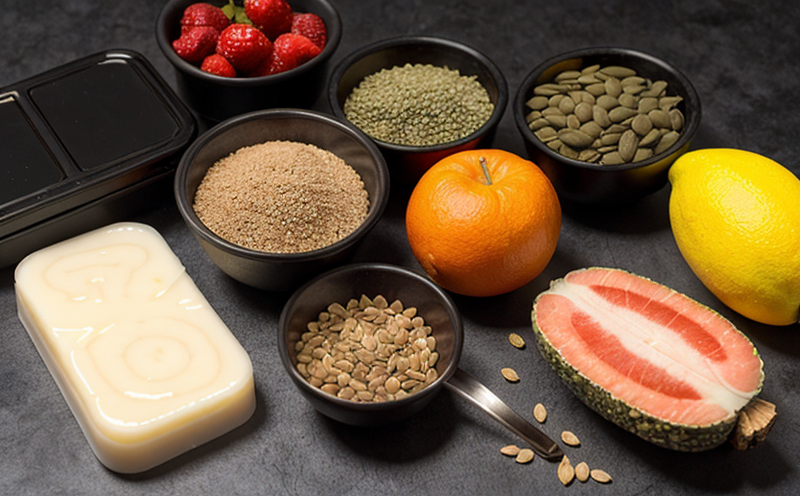ISO 2175 Determination of Moisture and Ash in Dried Fruits
The ISO 2175 standard is a globally recognized method used to determine the moisture content and ash content of dried fruits. This test is crucial for ensuring product quality, compliance with food safety regulations, and consistency across production batches. The process involves drying a known mass of the sample in an oven at precise temperature settings (usually between 103°C and 105°C) until constant weight is achieved to measure moisture content. For ash determination, the dried sample is incinerated at approximately 525°C under controlled conditions.
The accuracy of these tests directly impacts product labeling and consumer safety. Misrepresentation of nutritional values or presence of excess ash can lead to regulatory issues and damage brand reputation. Compliance with international standards such as ISO 2175 ensures that food manufacturers meet the highest quality benchmarks, particularly in sectors like natural health supplements, organic products, and specialty food markets.
Our laboratory employs advanced analytical equipment, including precision balances, ovens, and incinerators, to ensure precise measurement of moisture and ash content. The process involves rigorous sample preparation and handling techniques to minimize errors. Our team of experts follows the ISO 2175 protocol meticulously, providing reliable results that are essential for quality assurance and product development.
The results from this test are not only critical for regulatory compliance but also play a pivotal role in R&D activities. For instance, understanding moisture content can help in optimizing drying processes to enhance shelf life and texture. Ash analysis aids in identifying potential contaminants or nutrient additives that might affect the final product. This information is invaluable for quality managers and compliance officers ensuring products meet safety standards.
Our service also extends to providing detailed reports tailored to specific client requirements, which can be used for internal audits, supplier evaluations, or marketing purposes. By offering comprehensive testing services based on ISO 2175, we support businesses in maintaining high-quality standards across their supply chains and production processes.
Benefits
The benefits of adhering to the ISO 2175 standard extend beyond mere compliance; they contribute significantly to a company's overall success. By accurately determining moisture and ash content, businesses can:
Ensure product consistency across batches.
Avoid potential health hazards associated with excess ash or insufficient moisture.
Comply with international food safety standards, thereby protecting brand reputation.
Optimize production processes to reduce waste and improve efficiency.
Enhance product labeling accuracy, which is essential for maintaining consumer trust.
Support the development of new products by providing crucial data on raw materials.
Facilitate easier auditing and certification processes with regulatory bodies.
In summary, ISO 2175 testing is more than just a compliance requirement; it is an integral part of maintaining product integrity and meeting the expectations of discerning consumers.
Why Choose This Test
Selecting the right test for moisture and ash content in dried fruits can have profound implications on your business operations. Here’s why choosing ISO 2175 is advantageous:
Absence of Bias**: The standardized procedure ensures that all samples are tested under identical conditions, reducing variability.
International Recognition**: Compliance with international standards enhances credibility and opens doors to global markets.
Consistency Across Samples**: By following a set protocol, you ensure that each batch of dried fruits meets the same high-quality standards.
Regulatory Assurance**: Meeting these requirements guarantees adherence to food safety regulations and reduces the risk of legal issues.
Enhanced Product Quality**: Accurate measurement helps in optimizing production processes, leading to superior product quality.
Competitive Edge**: Demonstrating commitment to quality through rigorous testing can set your products apart from competitors.
In a competitive market, these advantages translate into increased customer satisfaction and loyalty, which are vital for sustainable growth.
Use Cases and Application Examples
The determination of moisture and ash content in dried fruits is applicable across various industries. Here are some specific use cases:
Natural Health Supplements**: Ensuring that the moisture content does not lead to mold growth while controlling ash levels prevents contamination.
Organic Products**: Compliance with ISO 2175 helps maintain organic certification and ensures product purity.
Specialty Foods**: For products like dried fruits used in gourmet dishes, accurate moisture content is crucial for maintaining desired texture and flavor.
Supply Chain Management**: Regular testing can help monitor the quality of raw materials from suppliers to ensure consistency throughout the supply chain.
R&D Innovation**: Insights gained from these tests support innovation in formulation and production methods, leading to new product offerings.
These examples illustrate how ISO 2175 testing is integral to various aspects of food manufacturing, from quality control to product development. By leveraging this standard, businesses can stay ahead in the competitive landscape.





